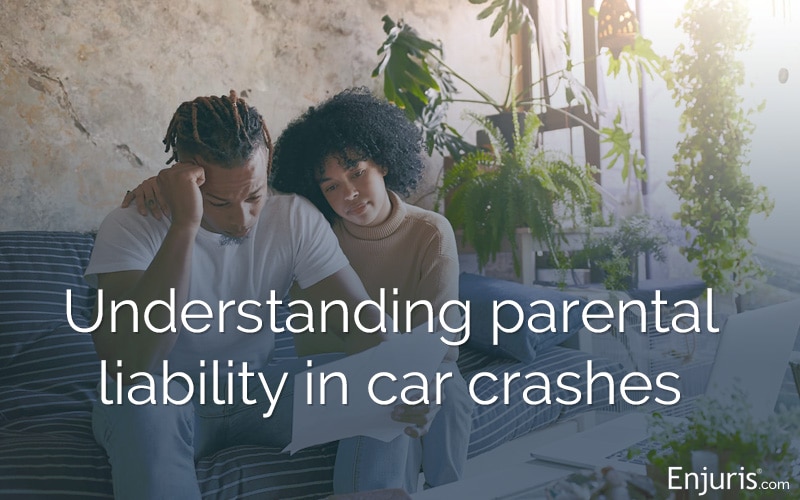
Every parent fears the call: the one informing them that their child has been in a car accident.
But beyond the immediate concern for their child’s well-being, another question looms: can parents be held liable for their child’s car crash?
Let’s explore the legal intricacies.
The foundations of parental responsibility
Before we explore some specific scenarios, it’s important to understand the basic concept of “parental responsibility.”
This legal theory asserts that parents can be held liable for the negligence or wrongful actions of their minor child. Different states have different laws regarding parental responsibility, but the core idea remains consistent.
For example, parents in California can be held liable for the intentional or reckless misconduct of their minor children. In Oklahoma, parents can only be held liable for the criminal acts of their children.
Most states cap the amount of damages that can be recovered when suing a parent. To stick with California as an example, the Golden State limits the amount of recoverable damages in parental responsibility suits to $25,000.
Understanding age limits in parental responsibility laws
Laws differ from one state to another regarding the age at which parents are held accountable for their children's actions and when this accountability ceases. In the majority of states, parents are legally accountable from the birth of their child until they turn 18. However, some states set boundaries, either starting liability from a certain age, like 10 or 11, or extending it until the child reaches 21.
Negligent entrustment: When parents knowingly take risks
One of the primary ways parents might find themselves on the hook for their child’s car accident is through the doctrine of “negligent entrustment.”
If a parent allows their child, who they know (or should know) is unfit to drive due to inexperience, impairment, or a history of recklessness, to use the car, they could be found liable.
Illustrative hypothetical: The case of Ricki and Alex Mitchell
Ricki Mitchell was a loving mother of three who lived in Chicago, Illinois. Her youngest child, Alex, was a 19-year-old college student.
On a Friday around midnight, Ricki received a call from Alex. He sounded distressed and informed her that he’d had a bit too much to drink at a friend’s party. Ricki was relieved that Alex had called instead of attempting to drive home, but she was also concerned about his well-being. Instead of suggesting that Alex take a taxi or use a ride-sharing service, Ricki made what she would later regret as a fatal mistake. She told Alex to wait 30 minutes, drink some water, and then drive home.
Ricki believed that the short delay and some water might help Alex sober up just enough to get home safely. She also considered the fact that Alex's route from the party covered less than two miles through quiet suburban streets.
Unfortunately, the combination of dark roads, impaired judgment, and alcohol's lingering effects proved catastrophic. Just three minutes into his drive, Alex swerved into an oncoming vehicle, causing a head-on collision. Both Alex and the driver of the other car sustained serious injuries.
The aftermath was a whirlwind of hospital visits, guilt, and, inevitably, legal consequences. The driver of the truck, Jack Snow, decided to file a personal injury lawsuit against Alex for the damages and injuries he sustained. But Jack Snow’s attorney, after learning of Ricki’s decision to allow Alex to drive while knowing he was intoxicated, saw grounds for a negligent entrustment claim.
Jack’s attorney argued that Ricki knowingly and negligently entrusted the vehicle to Alex, fully aware of his impaired state. They claimed that a reasonable person, under the same circumstances, would not have allowed an intoxicated individual access to a car, regardless of any perceived safety features.
Ricki’s decision, which was made out of concern and a wish to protect her son, had unintentionally opened her up to legal liability. In this hypothetical case, the doctrine of negligent entrustment squarely placed responsibility not only on Alex for deciding to drive but also on Ricki for allowing him to do so in the first place.
Other paths to parental liability
Beyond negligent entrustment, there are other ways to holding parents liable for their child’s car accident. Here are the most common routes:
- Inadequate supervision: If a parent fails to supervise their child adequately, they might be found at fault. For example, a parent who knows their underage child has a tendency to take the car without permission but doesn’t take precautions to secure the car keys might be liable for inadequate supervision.
- Vicarious liability: In certain states, a parent can be held liable for a car accident caused by their child, regardless of the circumstances.
- Direct negligence in vehicle maintenance: Parents have a responsibility to ensure the vehicles they own are safe to operate. If a parent fails to maintain essential parts of a vehicle, such as brakes or tires, and this neglect directly leads to an accident when their child is driving, the parent could be held liable. For instance, if a parent is aware that the car's tires are balding and pose a high risk of causing a blowout but still allows their child to drive it, their direct negligence in vehicle maintenance could be grounds for liability.
The question of parental liability for a child's car accident isn't straightforward. Factors such as state laws, the specifics of the incident, and the parents' actions all play pivotal roles. If you find yourself in a situation where you might face legal repercussions due to your child's car accident, seeking qualified legal counsel is imperative. Understanding your rights and potential liabilities can be the first step in navigating these challenging waters.
